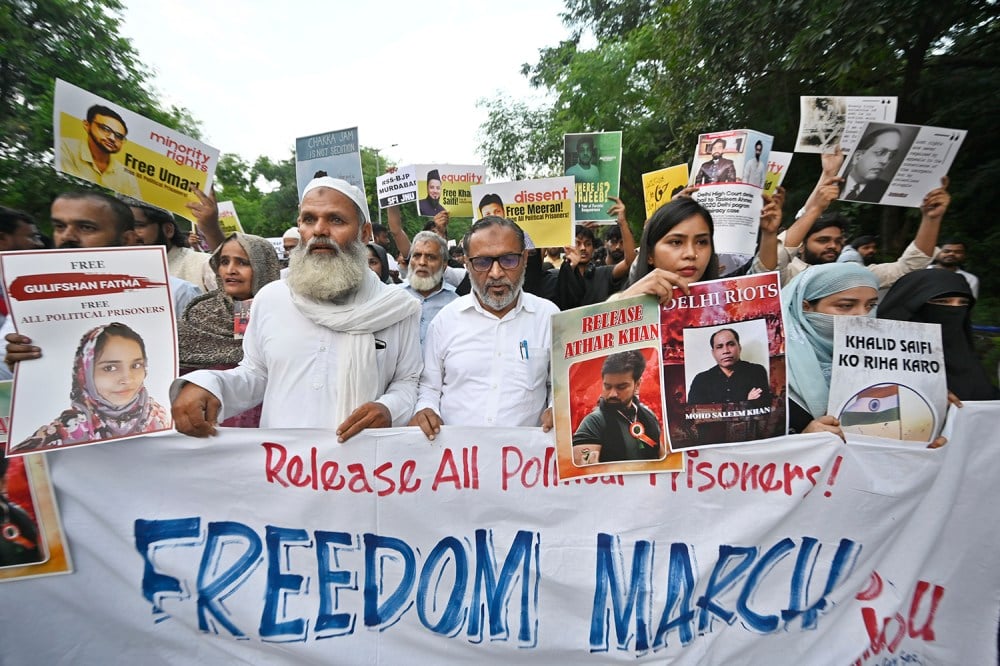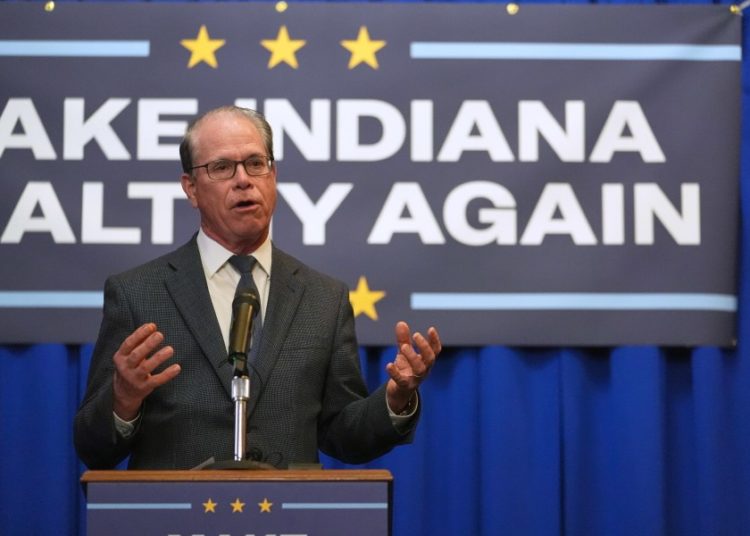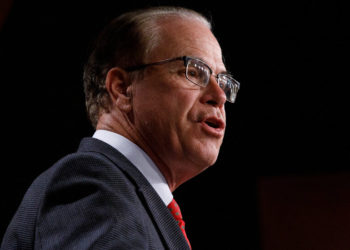Sept. 13 marked five years of incarceration without bail or trial for Indian activist Umar Khalid, who is detained on terrorism charges that appear politically motivated. On Sept. 2, the Delhi High Court denied his bail plea again, alongside that of others. Khalid challenged the decision and appealed to the Indian Supreme Court, which voted on Thursday to defer a hearing on the matter.
Khalid, now 38, came of age as a student activist during a period of steep democratic decline in India. This period—beginning as Prime Minister Narendra Modi’s Bharatiya Janata Party (BJP) came to power—was marked by increasing attacks on free speech and press freedom, opaque political funding, weakened electoral oversight, legal targeting of critics and opponents, and rising hate crimes against minorities.
Khalid became a powerful symbol of dissent, especially for Indian Muslims. He was arrested in what was widely seen as an attempt to silence Muslim activists protesting the 2019 Citizenship Amendment Act (CAA), which created a pathway to Indian citizenship for some persecuted religious minorities from neighboring countries but excluded Muslims. Khalid’s continued detention—and that of other Muslim activists who opposed the controversial law—sends a message that in today’s India, Muslim dissent is punished indefinitely.
For India’s Muslim community, the Modi era has been a dark chapter. In recent years, Muslims have faced mob lynchings by Hindu vigilantes on the suspicion of transporting cattle for slaughter, authorities have ignored anti-Muslim hate rallies, and calls for social and economic boycotts of Muslims and Muslim-owned business have become more common.
Meanwhile, the Indian judiciary has largely failed to check rising authoritarianism—delaying a ruling on the constitutionality of the 2019 CAA, upholding the revocation of Muslim-majority Kashmir’s special autonomous status, and awarding the land on which the illegally demolished Babri mosque once stood to Hindu parties to a build a landmark new temple.
Still, many people have turned to India’s courts for basic relief. Denying bail to Khalid and other Muslim activists despite clear legal precedent and their long pretrial detention goes beyond a setback for the detainees: It signals a frightening unwillingness of the judiciary to stand up to power in its most basic duty.
In the wake of the passage of the CAA, and amid threatening discourse from Indian Home Minister Amit Shah and discussion of a nationwide citizenship register, Muslims feared what might happen to them if they could not provide papers to prove that they were citizens. As the anti-CAA movement grew, Hindus and Muslims came together to protest in multiple cities, leaving the Modi government stunned.
When Khalid was arrested on Sept. 13, 2020, he was accused of plotting communal violence in New Delhi that coincided with U.S. President Donald Trump’s visit that February. Violence broke out in low-income neighborhoods in northeast Delhi on Feb. 23, after anti-CAA protesters staged a sit-in beneath a metro station the day before and blocked a road. The unrest escalated into three days of riots—the worst episode of religious violence in the capital since the anti-Sikh pogroms that followed Prime Minister Indira Gandhi’s assassination in 1984.
Of the 53 people killed during the 2020 Delhi riots, roughly three-quarters were Muslims.
Nonetheless, police said the anti-CAA movement was a cover for planning the riots, accusing its leaders of fearmongering and attempting to escalate the protests into a chakka jam, or a form of roadblock protest. The authorities argue that the goal of the movement was to create chaos that would lead to communal violence.
In connection with this alleged conspiracy, the police have filed charges of terrorism, sedition, and murder against 18 people, 16 of whom are Muslim. Though the Delhi High Court denied bail to Khalid for the second time on Sept. 2, some of those accused have had bail pleas pending for three and half years—arguing their cases before three different benches without a verdict.
Khalid is portrayed as the mastermind of the plot. He first rose to national attention in 2016 as a postgraduate student at Jawaharlal Nehru University (JNU) during a controversy over an event held to mark the execution of Afzal Guru, a Kashmiri man convicted in the 2001 Indian Parliament attack—a case that many Indians consider to be deeply flawed.
The government’s crackdown on the JNU event sparked widespread protests and led to sedition charges against three students: Kanhaiya Kumar, who later joined the Communist Party of India and then the Indian National Congress party; Anirban Bhattacharya, now a researcher; and Khalid, who went on to co-found the United Against Hate campaign. In 2022, the Indian Supreme Court effectively paused all ongoing sedition cases by putting the colonial-era sedition law on hold.
By that time, Khalid had been held in jail for the terrorism charges for nearly two years. In India, people facing trial often sit in prison for years as cases move at a glacial pace through the courts. An overwhelmed judicial system displays deep apathy toward these detainees, with hearings sometimes spaced weeks or months apart and frequently adjourned.
However, the proceedings in Khalid’s case go beyond this systemic problem—they seem to be a deliberate attempt to turn the legal process into punishment.
With authorities presenting no evidence linking the accused to rioters or weapons, the case rests largely on WhatsApp messages from protest groups and testimony from protected witnesses—many of whom gave near-identical statements recorded after the activists were arrested. According to reporting from Article 14, one witness gave inconsistent accounts in four statements about a Jan. 8, 2020, meeting where they said Khalid and others discussed funding riots during Trump’s visit. The Quint, an Indian digital news outlet, reported that on the date of the alleged meeting, there was not yet any public information about Trump’s planned visit.
During more than two months of anti-CAA protests in 2020, police produced only one speech as evidence against Khalid—made in the city of Amravati, more than 1,000 kilometers (620 miles) from Delhi, a week before the riots. In it, Khalid urged people to take to the streets during Trump’s visit to India in protest of the CAA, but he did not call for violence, instead invoking Mahatma Gandhi’s methods of civil disobedience.
When the police filed the case on March 6, 2020, they only had a clip of the speech that had been shared by a BJP official. According to Khalid’s defense, the authorities only retrieved the raw footage four months later.
The weakness of the police case became clear in June 2021, when the Delhi High Court heard extensive arguments for the first time and granted bail to three of Khalid’s co-accused. A division bench found “absolutely nothing” in the charge sheet to justify the terrorism charges, criticizing the police for using “hyperbole” and “stretched inferences,” blurring the line between protest and terrorism.
Shaken by the High Court’s criticism, the police rushed to the Supreme Court to get a stay on the bail order; the Supreme Court granted the stay just days later and ruled that the bail order would not be treated as precedent. The message to the courts was clear: The state was intent on shielding itself from further embarrassment. In 2022, despite the same facts presented about the alleged conspiracy, a High Court bench that included one of the same judges that granted bail to others a year earlier denied bail to Khalid.
In this year’s Sept. 2 order, a different bench found Khalid’s speech to be “inflammatory.” This time, the High Court said that a delay in proceedings was not always grounds for granting bail and remarkably concluded there had been no delay even after five years with no trial. It rejected comparisons of Khalid to the co-accused who were previously granted bail.
Khalid is not the only one languishing in prison. Gulfisha Fatima, a 32-year-old Muslim woman from a low-income background, has been denied bail after five and a half years in pretrial detention in the same case. Sharjeel Imam, a JNU Ph.D. student arrested a month before the 2020 riots on charges of sedition and “promoting enmity between different groups” has spent nearly six years in jail despite the reality that his words—however controversial—fall within the bounds of constitutionally protected speech.
The Delhi High Court’s Sept. 2 order followed hearings that began in December 2024. For some of Khalid’s co-accused, it was the third High Court bench to hear their bail pleas in a little more than three years, a clear disregard for Supreme Court precedent that emphasizes the timely disposal of bail applications. On Sept. 12, the Supreme Court reiterated that “applications concerning personal liberty cannot be kept pending for years,” recommending that such pleas be decided within two months.
Still, Khalid’s case remains in limbo, now awaiting a Sept. 19 Supreme Court hearing. What India is witnessing is not just democratic decline—but a cultural shift in which the public spectacle of suffering has become normalized.
The post Indian Activist Passes Five Years in Pretrial Detention appeared first on Foreign Policy.




